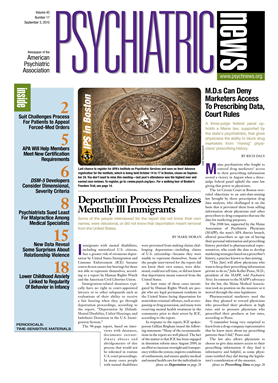Will mental illness treatment find a room in the emerging “medical home”? It can, but only with some significant remodeling to the house, according to a report to the Agency for Health Quality and Research (AHQR) prepared by Mathematica Policy Research. The report is titled “Integrating Mental Health Treatment Into the Primary Care Medical Home.”
The “primary care medical home”—a conceptual model of health care delivery that has garnered widespread interest among policymakers—will need fundamental adjustments to accommodate the special needs of patients in the primary care setting with mental illness, according to Mathematica. That organization is a nonpartisan research firm that provides program evaluation and policy research for federal and state governments, foundations, and private-sector organizations.
(Originating with the American Academy of Pediatrics, the concept of the primary care medical home has since been defined in a 2007 joint statement by the American Academy of Pediatrics, American Academy of Family Physicians, American College of Physicians, and American Osteopathic Association as “an approach to providing comprehensive primary care for children, youth, and adults” and “a health care setting that facilitates partnerships between individual patients, their personal physicians, and when appropriate, the patient's family.”)
In its report for the AHQR, Mathematica said that the primary care medical home (PCMH) can and should integrate delivery of mental health care. “Overwhelming evidence indicates that mental health problems are common but often go unrecognized in primary care settings, that they compromise the quality and outcomes of treatment for physical health conditions, and that appropriate mental health treatment can alleviate these impediments to well-being,” the agency noted.
But important fundamental and systemic alterations to the medical-home concept will be necessary, especially to accommodate the special needs of children, those with serious and persistent mental illness, and those with substance use disorders.
The report describes five policy or programmatic actions necessary to integrating mental health into the PCMH:
•.
Normalize mental health in mainstream medical practice.
•.
Integrate reimbursement for the time and resources needed to provide mental health treatment in the PCMH.
•.
Create a roadmap for implementation and performance assessment.
•.
Determine the most effective and cost-effective effective implementation of mechanisms for populations with complex mental health problems.
•.
Create and/or disseminate the tools needed by primary care providers to provide high-quality, patient-centered services.
Psychiatrist Thomas Smith, M.D., medical director for the New York City Mental Health Care Monitoring Initiative of the New York State Office of Mental Health, called the Mathematica report a good resource that summarizes the relationship between mental illness and other medical conditions.
“I think it makes the case very well for examining these PCMH models and moving them forward to integrate mental health treatment,” he told Psychiatric News. “I think its greatest strength is the way it summarizes what we know about the relationship between mental health issues and medical conditions, and the high rates of mental illness in people with chronic medical conditions, as well as the high rates of medical conditions in people with serious and persistent mental illness.”
In an April 2009 article in Psychiatric Services, Smith and psychiatrist Lloyd Sederer, M.D., director of the New York State Office of Mental Health, proposed a “mental health home” for those with serious and persistent mental illness that would incorporate medical-home characteristics including access to and coordination of services, integration of primary and preventive care, adoption of a recovery orientation and evidence-based practices, and family and community outreach (Psychiatric News, June 5, 2009).
In his review of the Mathematica report, Smith reiterated that the enormous needs of those with serious mental illness—and the fact that their routine point of contact with the health system is typically with a psychiatrist or mental health professional—argued for a “specialty” medical home. The concept was also advanced in the article “Specialty Care Medical Homes for People With Severe, Persistent Mental Disorders” by Richard Frank, Ph.D., and others in the May Health Affairs.
But Smith noted that a mental health specialty home will require psychiatrists to take on functions typically assumed by primary care physicians.
“It's an idea that is just beginning to get circulated, and we have a lot of work to do,” Smith said. “One of the things that psychiatrists must decide is how far into the primary care world we can comfortably venture. That is, are we as psychiatrists going to monitor for basic medical conditions? And how far are we going to go in advising our patients about these conditions?
“We have been challenged by the medical-home movement to think carefully about what we see as the boundaries of our work and to develop standards of care and expectations for how we will function as the primary caretakers for people with serious and persistent mental illness.”
